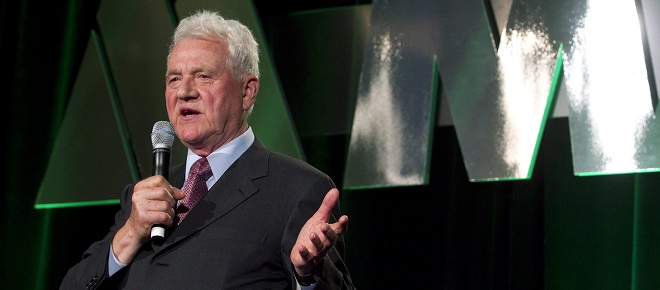What Frank Stronach and Michael Ignatieff have in common
Tease the day: Stronach’s opponents are going after him as “just visiting”, more or less
Magna International Inc. Chairman Frank Stronach speaks at the company’s annual general meeting in Markham, Ont. on Wednesday May 4, 2011. Stronach, the tool and die maker who went on to build a multibillion dollar international auto parts empire, stepped down as chairman after the meeting .THE CANADIAN PRESS/Frank Gunn
Share

Frank Stronach might have a few things to learn from Michael Ignatieff. If you didn’t know, the 80-year-old Austrian-Canadian billionaire has returned to his native land to pursue a political career. Over the weekend, his party—Team Stronach, named after guess who?—won a dozen seats in separate state elections. Stronach’s claiming valuable momentum in advance of Austria’s federal election in September, where he says the party “should do well.” Only now, there’s a refrain common to Ignatieff’s fleeting experience bubbling up into the public conversation.
Federal Chancellor Werner Faymann, who leads the Social Democratic Party that was the top vote-getter in one of the state elections over the weekend, cast doubt on the Canadian ex-pat’s devotion to country. “I have met Frank Stronach and he strikes me as someone who will not stick around if he is not successful,” said Faymann. “He is not someone who should shape the future of Austria.” Faymann and Stephen Harper might not share much in common, but they certainly share an aversion to globe-trotting opponents.
What’s above the fold this morning?
The Globe and Mail leads with the tenuous unity of B.C.’s provincial cabinet in the wake of Premier Christy Clark’s handling of recently leaked documents related to winning the ethnic vote. The National Post fronts calls for Clark’s resignation. The Toronto Star goes above the fold with Ontario’s potential tuition plan, which could allow universities to increase tuition only by inflation plus one per cent. The Ottawa Citizen leads with the Canadian Army’s plans to reduce training in the Arctic, as well as other challenging environments. iPolitics fronts European calls for austerity in Italy. CBC.ca leads with Cardinals in the Vatican entering pre-Conclave meetings. National Newswatch showcases the Toronto Star‘s scoop that Liberal leadership contender Justin Trudeau signed up 150,000 “supporters.”
Stories that will be (mostly) missed
| 1. Algeria. Canadian investigators hoping to shed light on the alleged involvement of two Canadians in a hostage-taking at a gas plant have been given access to “relevant information.” | 2. Elliot Lake. A public inquiry into the collapsed roof at an Elliot Lake mall—which killed two women last June—begins today and is expected to last into the summer. (Maclean’s writer Michael Friscolanti, who recently wrote an e-book about the mall collapse, is in Elliot Lake to cover the public inquiry.) |
| 3. Space flights. A handful of Canadians who aren’t affiliated with the Canadian Space Agency might be the next canucks in space—all as part of commercial ventures. | 4. Food security. The UN’s right-to-food envoy, whose controversial trip to Canada earned the ire of Conservative cabinet ministers, releases his report on Canada today. |